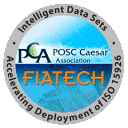| Version 2 (modified by jbourne, 16 years ago) |
|---|
TracNav menu
-
RDS/WIP project
- RDS/WIP Introduction
-
RDS/WIP World View
- Models, Data & Meta-Data
- Paths to Interoperability
- Automated Mapping
- Thought and Language
- Coarse to Fine
- Fine to Coarse
- Template Methodologies
- Choice of System
- Conclusions
- RDS/WIP Sample Queries
- RDS/WIP Staging Diagrams
- RDS/WIP 1.0 Plan
- RDS/WIP 1.0 Testing
- RDS/WIP 1.0 Process
- RDS/WIP 1.0 Inventory
- RDS/WIP 2.0 Plan
- RDS/WIP ID Generator
- RDS/WIP Domain Proposal
- RDS/WIP Requirements Table
- RDS/WIP Use Case: Discrete Editing
- RDS/WIP Use Case: CSV Upload
- RDS/WIP 1.0 General Use Cases
- RDS/WIP 2.0 General Use Cases
- RDS/WIP ISO 15926 Template Definitions
- RDS/WIP OWL/RDF Definition
- RDS/WIP OWL/RDF Project Plan
- RDS/WIP Forums
-
External
- RDS/WIP Use Case: Bulk Upload

POSC-Caesar FIATECH IDS-ADI Projects
Intelligent Data Sets Accelerating Deployment of ISO15926
Realizing Open Information Interoperability
RDS/WIP World View
IDS-ADI envision the RDS/WIP as a collaborative space for development and publication of multiple reference data libraries and the mappings between them.
This page seeks to show what differentiates libraries, the methodologies that produce them, approaches to mapping and the means by which all of these together address interoperability.
Model and Data
Probably the most important underpinning of the RDS/WIP as a concept is that the model is meta-data, and meta-data is data.
It is a short and simple step from this to establish that if you must transmit models, meta-data and related data, then it is simplest to utilise a system that allows you to treat all of that information in the same way, so that you can operate on meta-data and models just as though they were data.
To this end, we chose RDF and its supporting technologies (triplestores, OWL, SPARQL and URIs) as core elements of the RDS/WIP.
Relations, Classes and Members
Since RDF views all information as binary relationships, it becomes necessary to cast information into that mold in order to incorporate it into the RDS/WIP.
(@todo introduce notion of "system" to describe models built on the same foundation)
(@todo link to description of, differences between this and OO, ER etc.)
Templates
While it is possible to just put raw RDF into the RDS/WIP, its useful (and in fact easier), to leverage previous work in adapting other systems to RDF. Moreover, providing some common structure makes transformation between systems far easier.
While RDF provides three core concepts: binary relations, classes, and membership in classes, the most common missing pattern that we see in other systems is n-ary relations.
In the RDS/WIP we borrow the term "template" from ISO 15926 to describe an n-ary relation and its related definitional rules and meta-data.
Arriving at Definitions
To make a set of definitions work well together, it is necessary for them to have been produced via some cohesive process. We call these processes "methodologies".
Different methodologies can be used to create sets of definitions in the same model. Sometimes, these sets of definitions will overlap, but for the most part they will be substantively different.
Paths to Interoperability
- Translations: Language to Language Integration
- Lingua Franca: Common Language for Integration
- Universal Language: Single Language for All Purposes (@todo discussion to add)
Choice of System
The RDS/WIP is intended to be able to hold reference data for many systems, so in order to contribute to the RDS/WIP, the submitter must decide which system (or systems) to contribute to, or whether to create a new system.
1. The first step is to identify the methodology that was used (or will be used) to create your models. Find those systems that support similar methodologies. From that, strike off the systems that do not have other methodologies that you might want to use to prove your models. Also strike off models that are closed or otherwise inaccessible to the submitter.
2. Step two is to reduce the candidate models to some rough templates, and identify the classes and templates required. From the list of systems in step one, keep those systems that have the base classes that support your models, or at least ones that provide a good foundation.
3. Step three is to eliminate those systems that do not provide any additional methodologies that the submitter considers necessary to prove the models they produce, and those which do not provide a path towards specific standardization regimes otherwise necessary.
The remaining systems should be targets for the new reference data. In practice, many systems could fit the bill, and the difference between them may lie in personal or political preference, user community presence, degree of rigour and so on. Fundamentally though, it is the methodology that is most important to get right, since it is the methodology that usually leads standardization.
(@todo note long - consider moving to sub page)
(@note embedded comments contain notes)
